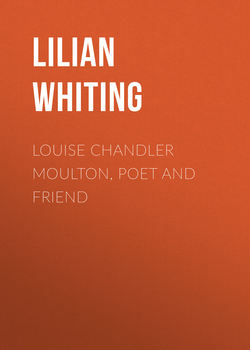Louise Chandler Moulton, Poet and Friend

Реклама. ООО «ЛитРес», ИНН: 7719571260.
Оглавление
Lilian Whiting. Louise Chandler Moulton, Poet and Friend
CHAPTER I. 1835-1853
CHAPTER II. 1853-1860
CHAPTER III. 1860-1876
CHAPTER IV. 1876-1880
CHAPTER V. 1880-1890
CHAPTER VI. 1890-1895
CHAPTER VII. 1895-1900
CHAPTER VIII. 1900-1906
CHAPTER IX. 1907-1908
THE MOULTON COLLECTION
Отрывок из книги
IN a lyric written by Mrs. Moulton in after years, occurs the lovely line quoted above, which seems vividly to describe her as she stood, a girl of eighteen, on the threshold of a new phase of life.
Young as she was Miss Chandler had already, by her newspaper and magazine work, made for herself a reputation, and she now collected the papers which made up the volume spoken of in the previous chapter, "This, That, and the Other," with the encouraging result of a sale of twenty thousand copies. The North American Review was then almost the only magazine in the country exclusively devoted to criticism and the intellectual life. Much of the best literary work of the time, in the way of fiction and poetry, appeared in such periodicals as Godey's Lady's Book, Peterson's Magazine, and the like; and to these Miss Chandler was a constant contributor. The weekly newspapers were rich in poems by Longfellow, Emerson, Whittier, the Cary sisters, N.P. Willis, Poe, and many others of permanent fame. Besides these, a host of the transient singers of the day, literary meteors, flitted across the firmament, not unfrequently with some song or story which individually was quite as worthy of recognition as were those of their contemporaries whose power to sustain themselves in longer flights and to make good the early promise has earned their title to permanent recognition. Mrs. Moulton's scrapbooks indicate how rich were the literary columns of the newspapers in those days. There being then no international copyright law, the American editor enriched his page with the latest poem of Browning, Tennyson, Swinburne, or Mrs. Browning. Longfellow, Whittier, Holmes, Dr. Parsons, Nora Perry, William Winter, the Stoddards (Richard Henry and Elizabeth), N.P. Willis, Saxe, Mrs. Stowe, Jean Ingelow, Miss Mulock, Aldrich, and Mary Clemmer, are largely represented in these old scrapbooks. Many fugitive poems, too, appear, as the "Bertha" of Anne Whitney, a poem well entitled to literary immortality; the "Three Kisses of Farewell," by Saxe Holm; the "Unseen Spirits," by Willis, a poem too little known; and Mr. Aldrich's "The Unforgiven," excluded from his later editions, but which contains those beautiful lines:
.....
In music the taste was pure, if the opportunities were but provincial. Grisi and Mario in brief visits delighted the town in opera; the Handel and Haydn Society provided oratorio; the Harvard Orchestra gave instrumental concerts. In the spring of 1856 was held a Beethoven Festival, and the bronze statue, so long familiar in the old Boston Music Hall, was inaugurated with a poem by the sculptor, William Wetmore Story.
In intellectual life Boston had long been distinguished among American cities. In these early years of Mrs. Moulton's life here Lowell gave his course of lectures on "Poetry" before the Lowell Institute, and Curtis his course on "Bulwer and Disraeli." Longfellow at this time was writing "Hiawatha"; Richard Grant White was often coming over from New York to confer with the Cambridge group on nice points in his edition of Shakespeare. The interest in literature is illustrated by the fact that when "Maud" appeared in the summer of 1855 Longfellow and George William Curtis made a pilgrimage to Newport to read and discuss it with Mrs. Julia Ward Howe. The aristocratic ideal in the world into which Mrs. Moulton had come was distinctly intellectual rather than plutocratic.
.....